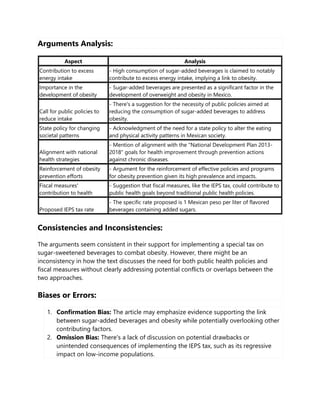course work critical thinking for week 3.docx
- 1. Arguments Analysis: Aspect Analysis Contribution to excess energy intake - High consumption of sugar-added beverages is claimed to notably contribute to excess energy intake, implying a link to obesity. Importance in the development of obesity - Sugar-added beverages are presented as a significant factor in the development of overweight and obesity in Mexico. Call for public policies to reduce intake - There's a suggestion for the necessity of public policies aimed at reducing the consumption of sugar-added beverages to address obesity. State policy for changing societal patterns - Acknowledgment of the need for a state policy to alter the eating and physical activity patterns in Mexican society. Alignment with national health strategies - Mention of alignment with the "National Development Plan 2013- 2018" goals for health improvement through prevention actions against chronic diseases. Reinforcement of obesity prevention efforts - Argument for the reinforcement of effective policies and programs for obesity prevention given its high prevalence and impacts. Fiscal measures' contribution to health - Suggestion that fiscal measures, like the IEPS tax, could contribute to public health goals beyond traditional public health policies. Proposed IEPS tax rate - The specific rate proposed is 1 Mexican peso per liter of flavored beverages containing added sugars. Consistencies and Inconsistencies: The arguments seem consistent in their support for implementing a special tax on sugar-sweetened beverages to combat obesity. However, there might be an inconsistency in how the text discusses the need for both public health policies and fiscal measures without clearly addressing potential conflicts or overlaps between the two approaches. Biases or Errors: 1. Confirmation Bias: The article may emphasize evidence supporting the link between sugar-added beverages and obesity while potentially overlooking other contributing factors. 2. Omission Bias: There's a lack of discussion on potential drawbacks or unintended consequences of implementing the IEPS tax, such as its regressive impact on low-income populations.
- 2. 3. Appeal to Authority: Mention of national strategies and plans might imply an appeal to authority, suggesting that the proposed action is justified simply because it aligns with broader governmental initiatives. Conclusions: The text concludes that implementing the IEPS tax on sugar-sweetened beverages is a necessary step to address the obesity epidemic in Mexico. It suggests that fiscal measures can complement traditional public health policies in combating obesity. Point of View and Research: The arguments reflect the perspective of policymakers and public health experts advocating for interventions to reduce sugar consumption as a means of tackling obesity. While the text does not explicitly cite specific research, it likely draws on existing scientific evidence and national health data to support its claims. Ordering of Arguments: To maintain focus and coherence, the analysis begins by identifying the main claims and arguments presented in the text. Each claim is then evaluated individually, considering its logical consistency, potential biases, and implications for the overall argument. Finally, conclusions are drawn based on the assessment of the text's arguments and underlying assumptions.


